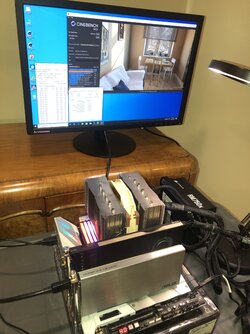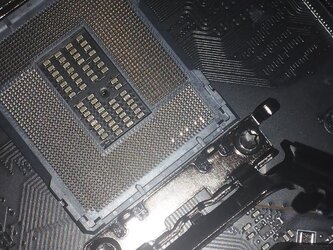Wasn't there something about board flex on Intel? Do the stability brackets eliminate that and related problems?
In theory, it helps, but I find a design flaw in Intel's sockets. Each time I see an issue with more pins, they're in a straight line or on some specific spot (like 4-6 next to each other). Sometimes it's 1-2 in the corner. Some series have pretty thick backplates, so it's hard to bend socket/PCB, and these issues still happen. MSI suggests it's from the cooler's mounting pressure, so as long as the socket isn't for some reason too fragile, then 3rd party brackets, like those from Thermalright or Thermal Grizzly, should help. I can't tell how it is in reality as I wasn't testing it, and these products were not available in the past.
There were 2 Foxconn socket issues in 2 different generations. Lotes sockets were fine, while in Foxconn, some pins could burn under higher currents. There were also issues with power design, but it was related to some motherboard series and manufacturers. No matter how you look at it, there are way too many socket issues in Intel motherboards, and we can't hear about repeatable issues in AMD motherboards.
For me, Intel is good for tests, and I sell most of them once the new generation is out or I no longer need them. In my daily/gaming PCs, I only have AMDs. Maybe the next Intel generation will be better, but the last couple of them were pretty bad in terms of efficiency/TDP/heat.
I'm still stuck between a rock and a hard place in what I want for my next main system. I don't expect either side to give me everything I want at a price I'm willing to pay. Zen 5 might have significant uplift in AVX-512 perf if you can tolerate separate CCDs and the long wait for X3D models, and Arrow Lake should be a big step forwards in general too.
I wasn't really convinced, but I like weird stuff, so I bought 2 Minisforums motherboards when they were on sale + additional promo codes. I say that as these motherboards have soldered Ryzen 7/9 CPUs that support AVX-512. They also support 2x M.2 PCIe 5.0, PCIe x16 slot (with bifurcation), 2.5GbE LAN, Intel WiFi 6E, and a cooler/heatsink is included. The only problem is that ordering it from the Minisforum store takes 1-2 months. On Amazon, there is only one version with an 8-core CPU -
https://amzn.eu/d/gNZFc61. It costs £395.99 for the CPU+mobo+CPU heatsink, so it's still not bad. It also requires SODIMM DDR5, but a regular 5200/5600 kit is enough.
Intel mobo has more options and offers RAM OC, but the CPU doesn't support AVX-512.
I'm not going to convince you it's a great motherboard, as it has its limits, but the price for what you get is pretty good. I run mine for 2 months 24/7 without issues. The CPU is low power (TDP can be adjusted up to 200+, but the CPU won't take more than ~120W). I also noticed that the mobile Ryzen 7000 is available up to 16 cores, while the 8000 is only up to 8 cores. The IPC is almost the same for both of them.
One advantage that I see in these mobile chips is that the CPU is low-powered but also keeps max boost on all cores, not only 2-4 like in desktop models. Once you unlock TDP and keep the CPU cool enough, then you will see all cores running at 5.1-5.4GHz (depending on the CPU). The Tj is 100°C and can be set higher, up to 115°C, so it's easier to keep it without throttling if you want a lower fan speed (I guess it's just because these CPUs are mobile series, so they have a higher range).
From bad things, the support is below average. They reply quickly and try to help, but I wouldn't count on BIOS updates or long support as the BIOS team is very small and jumps onto other products every couple of months. The warranty is for 2 years but requires shipping to Hong Kong (as I saw in the product comments).



